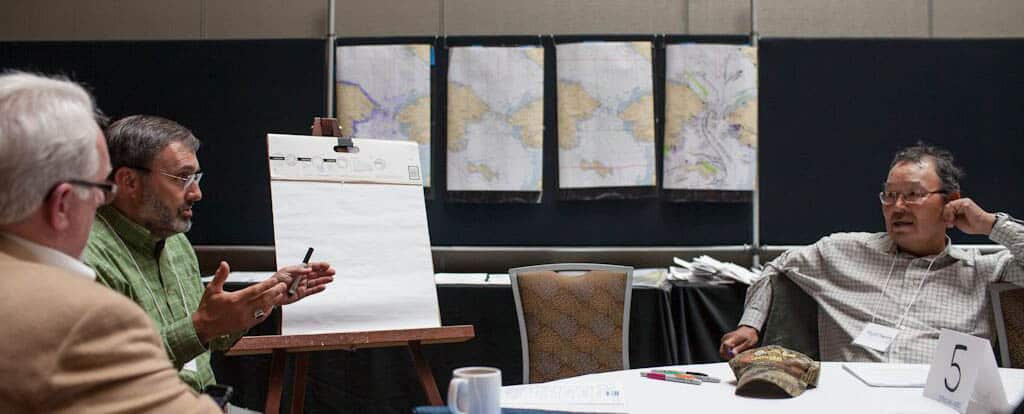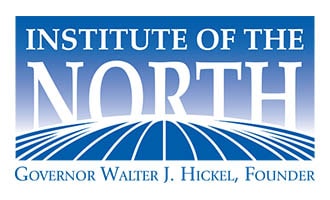
Arctic Public Opinion Poll
2016 Arctic Public Opinion Poll
Governor Walker launched the Alaska Arctic Council Host Committee in 2015 to provide hospitality and education during the U.S. Chairmanship of the Arctic Council. This body has worked to highlight Alaska perspectives and priorities by showcasing the state’s people and potential. The Host Committee has welcomed visiting delegations, informed Alaskans of Arctic Council activities and linked national and foreign decision makers to the realities, richness and responsibility of Alaska’s Arctic.
Recognizing that the end of the U.S. Chairmanship comes next May, the Host Committee leveraged an existing statewide poll, conducted by Alaska Survey Research, to ask four questions of Alaskans:
- Have you heard of an organization called the Arctic Council?
- Which country is the current chair?
- Have you seen, heard or read any media coverage about the Arctic Council in the last year?
- In the last 12 months, have you participated in any events related to the Arctic that dealt with issues like international cooperation, business, policy or research?
The results indicate work to do between now and next May, and in particular a real need to continue outreach to Alaskans about the Arctic Council but also and perhaps more importantly to provide more opportunities for Alaskans to connect with Arctic issues. The polling data is clear:
- 66% of Alaskans haven’t heard of the Arctic Council.
- Of those who had heard of the Arctic Council, only 34% correctly identified the United States as the current Chair.
- 55% of those who had heard about the Arctic Council had in the last 12 months seen, read or heard coverage in the media.
- 95% of Alaskans have not participated in an Arctic event related to international cooperation, business, policy or research.
Anchorage and Fairbanks have both in the last year hosted large Arctic conferences with 1,000 people attending from around the world. The Arctic Council, State Department, State of Alaska, and University of Alaska have all ramped up their communication and public outreach. And yet we are a long way from connecting with Alaskans the importance of the Arctic and the role of the Arctic Council.
2013 Arctic Public Opinion Poll
For millennia, the Arctic has been home to diverse peoples and rich cultural and natural values. A combination of environmental change, globalization, and the search for new resources is bringing the Arctic increased attention and activity in private and public circles, including those far beyond Alaska. For Alaskans to be effective participants in crafting future policies and practices in the Arctic, it is important to understand current level of knowledge, interest, values and aspirations with regard to the Arctic. Alaska’s leaders must also have this understanding in order to strengthen the state’s position in national and international settings; to mitigate the risks of increasing development, to leverage new opportunities, and to be responsible stewards in the Arctic. We cannot afford to ignore or misrepresent the Arctic. The decisions that we make now will affect the lives of generations to come.
For this reason, the Institute of the North commissioned a public opinion poll, with support from World Wildlife Fund to assess Alaskans’ knowledge of Arctic issues, general views about priority policy topics, and perceptions of effective and trustworthy conveyors of Arctic information. Because the Institute of the North and World Wildlife Fund share the goal of a sustainable future for Alaska, and because multiple task forces, committees, forums, and initiatives, have been formed to address Arctic issues, we found this an opportune moment to learn more about how Alaskans feel about the Arctic.
Both in purpose and method this poll draws on the 2011 report “Rethinking the Top of the World: Arctic Security Public Opinion Survey” commissioned by the Munk-Gordon Arctic Security Program and carried out by Ekos Research Associates. That report, based upon in-depth polling in Canada and comparative polling of the eight Arctic nations finds, broadly speaking, that respondents have complex and multidimensional views of the Arctic that include deep concern issues like the environment, economy and infrastructure and a concern that governments are not adequately prepared to address these issues in the Arctic. As the following pages reveal, American respondents in this Munk- Gordon poll share similar views but their responses indicate lower levels of Arctic knowledge (see Appendix C for a more detailed summary of the Munk-Gordon Arctic Security Public Opinion Survey).
To what extent are Alaskans prepared to answer key questions related to northern regions? How much is known about the Arctic and how do we prioritize multiple interests? Who can we trust for good information? It is these questions and more that drove the need for a baseline assessment of public opinion in Alaska on the topic. Local, national and international decision-makers require accurate and reliable information about Alaska’s needs and concerns in order to make responsible decisions. Inspired by the confluence of need and the lack of comparative data; this survey was designed to consider some of these questions.
Key Findings of the Alaska poll:
- Alaskans consider that environment (32.9%) and the economy (27.1%) are priority issues in the Arctic.
- Alaskans believe that the Arctic needs better infrastructure, education, and disaster response capacity, but worry that current status and levels of investment are insufficient. The same is true for respondents when asked about search and rescue, polices to protect indigenous cultures and environmental protection.
- In terms of addressing environmental issues, a majority of respondents (56.8%) think that the State of Alaska is best suited to take on these tasks in the Arctic; although it is worth noting that the second most popular response (17%) was that no group is fully capable of addressing these concerns.
- When respondents were asked about which institutions are most trustworthy for providing information on the Arctic, universities were given the highest rating, 6.4 out of 10. No other group, including various aspects of the state, was rated above 5.5 out of 10. The news media was rated the least trustworthy, with a mean rating of 3.2 (out of possible score of ten).
In gauging recognition of the Arctic Council, the poll found that while most respondents (51%) have not heard of that specific body, 81.7% of the respondents reacted favorably to the stated mission of Arctic Council as a forum for international collaboration.
